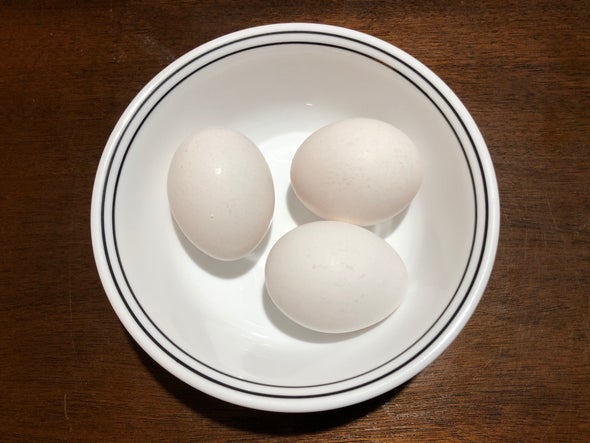(单词翻译:单击)
听力文本
Hi, I'm Scientific American podcast editor Steve Mirsky. And here's a short piece from the March 2020 issue of the magazine, in the section called Advances: Dispatches from the Frontiers of Science, Technology and Medicine.
The article is titled "Quick Hits," and it's a rundown of some noncoronavirus stories from around the globe, compiled by assistant news editor Sarah Lewin Frasier.
From the Dominican Republic:
A sunken museum at La Caleta Underwater National Park will preserve in place a ship that sank in 1725, complete with real (and replica) artifacts kept underwater for people to explore. Submerged artifacts often degrade faster when removed from the sea.
From Greenland:
New simulations indicate that a rocky valley detected under the island's ice sheet may contain a 1,600-kilometer-long subterranean river, flowing from central Greenland to its northern coast.
From Greece:
Archaeologists uncovered gold, jewels and beads in a large building on the now uninhabited Minoan island of Chrysi, a location that about 3,500 years ago was devoted to making purple dye from sea snails called Murex.
From England:
Researchers found 1,700-year-old chicken eggs, along with other ancient objects, in a waterlogged pit in southeastern England. A few eggs broke during extraction, releasing a sulfurous smell—but one remained intact, making it the only complete egg found from Roman Britain.

From Australia:
To help boost Sydney Harbor's endangered seahorse population, scientists bred baby seahorses in an aquarium and built crab-trap-like undersea "hotels" to protect them as they adapt to the wild.
And from Antarctica:
Scientists test-drove a meter-long, wheeled rover that streamed live views of the depths as it rolled along the underside of Antarctic ice. The Buoyant Rover for Under-Ice Exploration (BRUIE) could someday explore frozen-over seas on worlds such as Jupiter's moon Europa.
That was "Quick Hits," by Sarah Lewin Frasier.
参考译文
大家好,我是《科学美国人》播客编辑史蒂夫·米尔斯基。下面是本杂志2020年3月刊的一篇短文,摘自“进展:科学、技术和医学前沿快报”版块。
这篇文章名为《要闻快讯》,内容为非新冠病毒全球新闻报道的摘要,由助理新闻编辑莎拉·莱温·弗雷西尔汇总。
多米尼加共和国:
拉卡莱塔水下国家公园的沉没博物馆将原地保存1725年沉没的船只,将原件以及复制品保留水下供人们探寻。水下文物从海中迁移后,往往会加速降解。
格陵兰:
新模拟结果显示,在格陵兰岛冰川下发现的岩石山谷中,可能包含一条1600公里长、从格陵兰中部向北海岸流动的地下河。
希腊:
考古学家在如今无人居住的克雷西岛米诺亚居民区的一座大型建筑中发现了金子、珠宝和珠子,在大约3500年前,人们曾在此用一种叫“骨螺”的海螺制造紫色染料。
英国:
研究人员在英格兰东南部的一个积水坑中发现了1700年前的鸡蛋和其它古代物品。有几个鸡蛋被取出时破碎,释放出硫磺味,但有一个鸡蛋依旧完好无损,成为在罗马不列颠时代发现的唯一一个完整鸡蛋。
澳大利亚:
为了帮助提高悉尼港濒临灭绝的海马数量,科学家在水族馆养殖小海马,并建造了像捕蟹笼一样的海底“宾馆”,在海马适应野外环境时提供保护。
南极洲:
科学家们试驾了一辆一米长的轮式漫游车,该车沿南极冰川下面行驶时,可以实时显示所处深度的情况。将来,冰下探索浮力漫游车(简称BRUIE)可能会到木星卫星“木卫二”等其它星球上探测冰冻海洋。
以上是莎拉·莱温·弗雷西尔汇总的《要闻快讯》。
译文为可可英语翻译,未经授权请勿转载!
重点讲解
重点讲解:
1. remove from 移动;搬动;取出;
As soon as the cake is done, remove it from the oven.
蛋糕一烤好,立即把它从烤箱中取出。
2. be devoted to 专用于…的;
The final term will be devoted to project work.
最后一学期的时间将全部用于专题研究。
3. along with 与…一起;
There are 32 different kinds of chocolate on sale along with the bread and cakes.
有32种不同的巧克力与面包和蛋糕一起出售。
4. adapt to 适应;
We have had to adapt quickly to the new system.
我们不得不迅速适应新制度。


